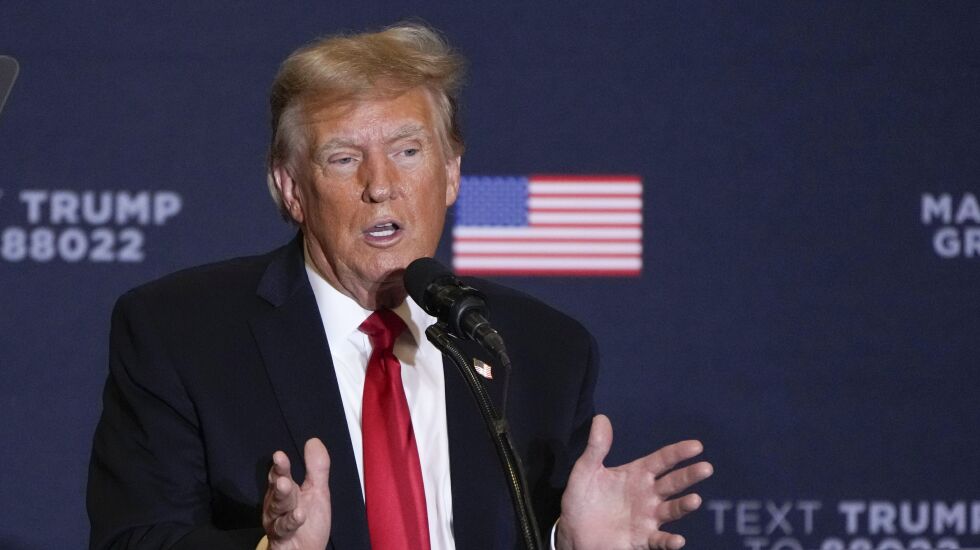
On Friday, the U.S. Supreme Court agreed it cannot ignore the biggest question of the 2024 election season: Is Donald Trump an insurrectionist and thus ineligible, under the Constitution, from seeking the presidency again?
The court’s decision to take up Trump’s appeal of a Colorado Supreme Court ruling in December that kicked him off that state’s ballot came a day after five Illinois voters filed the latest in a nationwide line of legal challenges to Trump’s candidacy. The group asked the state Board of Elections to disqualify Trump from the March 19 Illinois primary ballot.
Challenges are now pending in 18 states, have been dismissed in 12, and in two states, Maine and Colorado, Trump has already been kicked off the ballot, at least for now.
Clearly, Trump was not going away. He will fight tooth and nail to stay in the race, trouncing his Republican opponents in primary polls and using the legal challenges as fundraising fuel.
The Supreme Court will now settle the matter. Americans across the political spectrum deserve to know where the nation’s top court — widely distrusted as overtly political and ethics-challenged — stands on the issue.
This shouldn’t be an issue of potential “disenfranchisement,” as some Republicans claim. Voters aren’t being denied their choice, be it Trump or anyone else, if their candidate is ineligible for a particular office.
Nor should this be a matter of politics for some Democrats, who fear that throwing Trump off the ballot will only hurt their own candidate in the long run.
Big picture, the question of whether Trump is eligible to run for president gets to the heart of what makes American democracy tick: free and fair elections among candidates who, at the least, meet the basic qualifications to hold a particular office.
“We’re not engaging in politics here. We’re engaging in the application of constitutional principles,” attorney Matthew Piers, president of the Hughes Socol Piers Resnick & Dym law firm, which helped draft the objection, told WBEZ’s Dave McKinney, who first reported on the Illinois challenge.
“The law must be obeyed. And if the laws aren’t obeyed, you lose your constitutional democracy,” Piers said.
In addition, as we noted in a recent editorial, it’s a terrible idea to potentially have a patchwork of different ballots around the country. As different states rule who can and cannot be on the ballot, it throws open the door for an election that conspiracists will quickly dismiss as illegitimate.
It’s worth noting here that the fallout from the Big Lie about 2020’s “stolen” election continues to poison the national discourse and fool those inclined to believe in outlandish conspiracies: An alarming one-third of Americans still believe President Joe Biden’s election was not legitimate, a new Washington Post/University of Maryland poll found.
A ‘Pontius Pilate’ decision?
As challengers have elsewhere, the Illinois voters argue Trump violated Section 3 of the post-Civil War 14th Amendment, which bars those who have engaged in insurrection from holding public office. Citing Trump’s encouragement of the mob of supporters who attacked the U.S. Capitol on Jan. 6, 2021, to stop the certification of Biden as president, the challengers want Trump — who’s leading by large margins in Republican primary presidential polls — tossed off the ballot.
One way in which the Supreme Court could resolve the Colorado case: Ruling the decision about when and to whom Section 3 of the 14th Amendment applies is a political question for one of the other branches of government, likely Congress, to decide, as Aziz Huq, a constitutional law expert at the University of Chicago Law School, tells us.
In other words, the court could sidestep the issue — and by default, rule in Trump’s favor — by deciding that Congress must be the one to decide whether Trump engaged in insurrection and is thus ineligible to become president.
“It’s a very Pontius Pilate way of doing it,” Huq says.
Those trying to throw Trump off the ballot, in Illinois and elsewhere, will object to any ruling that leaves him in the race. But should that happen — at this point, even the most informed speculation is just speculation — Trump and his supporters shouldn’t crow too much.
Remember, it was two conservative lawyers who made the first high-profile case against Trump’s eligibility.
The professors, William Baude of the University of Chicago and Michael Stokes Paulsen of the University of St. Thomas, outlined the case against Trump in an article to be published this year in the University of Pennsylvania Law Review.
“When we started out, neither of us was sure what the answer was,” Baude told The New York Times in August 2023. He and Paulsen concluded, Baude said, that “Donald Trump cannot be president — cannot run for president, cannot become president, cannot hold office — unless two-thirds of Congress decides to grant him amnesty for his conduct on Jan. 6.”
That’s something for the justices to keep in mind.
Send letters to letters@suntimes.com







